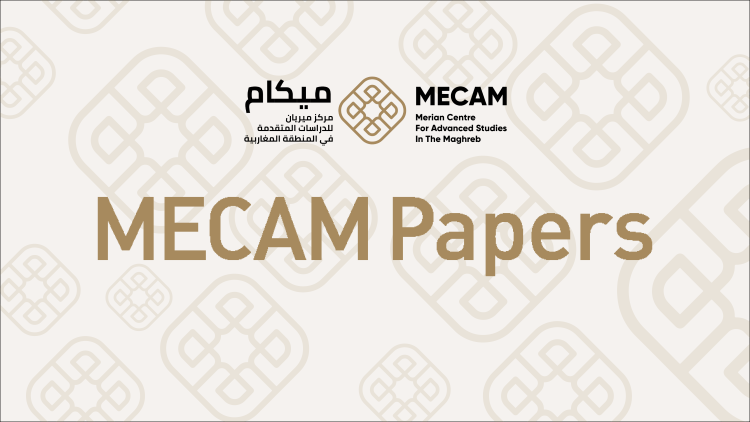- Startseite
- Forschung & Transfer
- Forschungsprojekte
- Merian Center for Advanced Studies in the Maghreb (MECAM): Imagining Futures - Dealing with Disparity, Phase II
Merian Center for Advanced Studies in the Maghreb (MECAM): Imagining Futures - Dealing with Disparity, Phase II
The Merian Centre for Advanced Studies in the Maghreb (MECAM) based in Tunis is the first and only Institute for Advanced Studies in North Africa. MECAM’s ambition is to become an intellectual hub that contributes to the emergence of cutting-edge, internationally relevant and visible research in the humanities and social sciences on, from and in the Maghreb and in particular with scholars from the Maghreb. The GIGA coordinates MECAM's publications as well as outreach and transfer activities.
BMBF, 2023-2029
MECAM Papers
Leitung
Koordinator:in
Forschungsfragen
1) Aesthetics & Cultural Practice addresses questions of how aesthetic forms and cultural practices influence the process by which models and imaginations of the future are expressed and (re-)negotiated. It also investigates the ways in which disparities, political and societal transformations influence aesthetic and cultural practices.
2) Inequality & Mobility focuses on social and economic inequalities, the resulting sense of insecurity, and their role in the (re-)negotiation of visions and models of the future. The IRF specifically explores how distinct forms of disparity (incl. concrete policy decisions) drive or restrain mobility and how in turn, mobility can exacerbate or mitigate inequality.
3) Memory & Justice discusses legacies of the past, including their legal, political and cultural perceptions and frames in relation to different assessments of the present and to models and (re-)negotiations of the future. Research will shed light on the ways in which differential access to political power shapes questions of accountability, factfinding, amnesty, judicial reforms, human rights claims and the legitimate sources of law in post-conflict societies and beyond.
4) Resources & Sustainability investigates how societies in general and political decisionmakers in particular deal with burgeoning socio-economic disparities and growing environmental problems. This IRF studies which economic models might ensure a politically, socially and ecologically sustainable future. Especially rentier and extractivist economic models in the Maghreb are explicitly addressed here as these models generate particular forms of disparities and thus also interesting visions of the future.
5) Identities & Beliefs examines co-existing, sometimes competing identities and belief systems which are partly impacted by political power dynamics. Disparities are felt, perceived and articulated very differently from the vantage point of diverse identities and beliefs, resulting in pluralistic ways of (re-) negotiating imaginations and models of the future.
MECAM’s five IRFs are complemented by three areas of methodological exploration cutting across research fields. The first area in this regard is devoted to considerations of gender, diversity, epistemologies, translations and research ethics. The second area are historical and comparative perspectives. The third area is digital research methods which are increasingly seen as drivers of scholarly innovation but which also contribute to deepening disparities in global knowledge production due to the differences in access between the Global North and the Global South.
Beitrag zu internationaler Forschung
As a Centre for Advanced Study in the Maghreb, MECAM will promote academic cooperation between researchers from different regional contexts in the Maghreb, the Mashreq, the Middle East and North Africa (MENA), Germany, Europe, i.e. the Global South and the Global North more broadly. With that, the Centre aims to downsize some of the persistent asymmetries in knowledge production, such as the dominance of the European and North American research traditions. By providing conditions for scholarly exchange in non-hierarchical and collaborative ways in the spirit of “research with the region” rather than merely “on the region” MECAM will contribute to increased visibility of studying Maghrebi affairs in general and of topics falling within the range of MECAM’s research fields in particular. Scholarly exchange will be additionally facilitated through collaborations with two network sites in Lebanon and Morocco. While interregionalism will be reflected in the composition of the Centre’s fellow groups and its governing bodies, MECAM’s systematic plurilingualism (Arabic, English, and French) will ease intellectual exchange, strengthen the dissemination of research results, and open up new promising research avenues.
Forschungsdesign und Methoden
MECAM will constitute a physical and discursive scholarly space in which different disciplines, methodological approaches, theoretical concepts, academic traditions, and individual experiences are shared and can eventually enter into a polylogue both within and beyond the Maghreb. The Centre aims to provide the best possible conditions for successful research collaborations in the humanities and social sciences by providing a unique platform for international scholarly exchange. It is thereby committed to establishing a coherent procedure for ethics clearance and guidelines ensuring a safe and inclusive working environment considering the specific challenges arising from a postcolonial setting.
Vorläufige Ergebnisse
MECAM’s form of international scientific cooperation will contribute to rethinking both traditional Area Studies approaches and mono-disciplinary perspectives in that it continues to foster interdisciplinary, inter-regional and inter-generational formats and activities. It is hoped that MECAM will also contribute to reducing the asymmetries in knowledge production between Germany and Tunisia, between the Maghreb and the Mashreq, the south and north of the Mediterranean specifically, and the so-called Global North and Global South more generally. In the mid- to long-term, it is MECAM’s objective to become an integral part of the Tunisian and Maghrebi intellectual landscape. Beyond fostering excellent scholarly exchange and innovation, it is MECAM’s objective in the main phase to further shape and impact broader societal discussions both in Tunisia and the Maghreb as well as in Germany, Europe and the Middle East.














